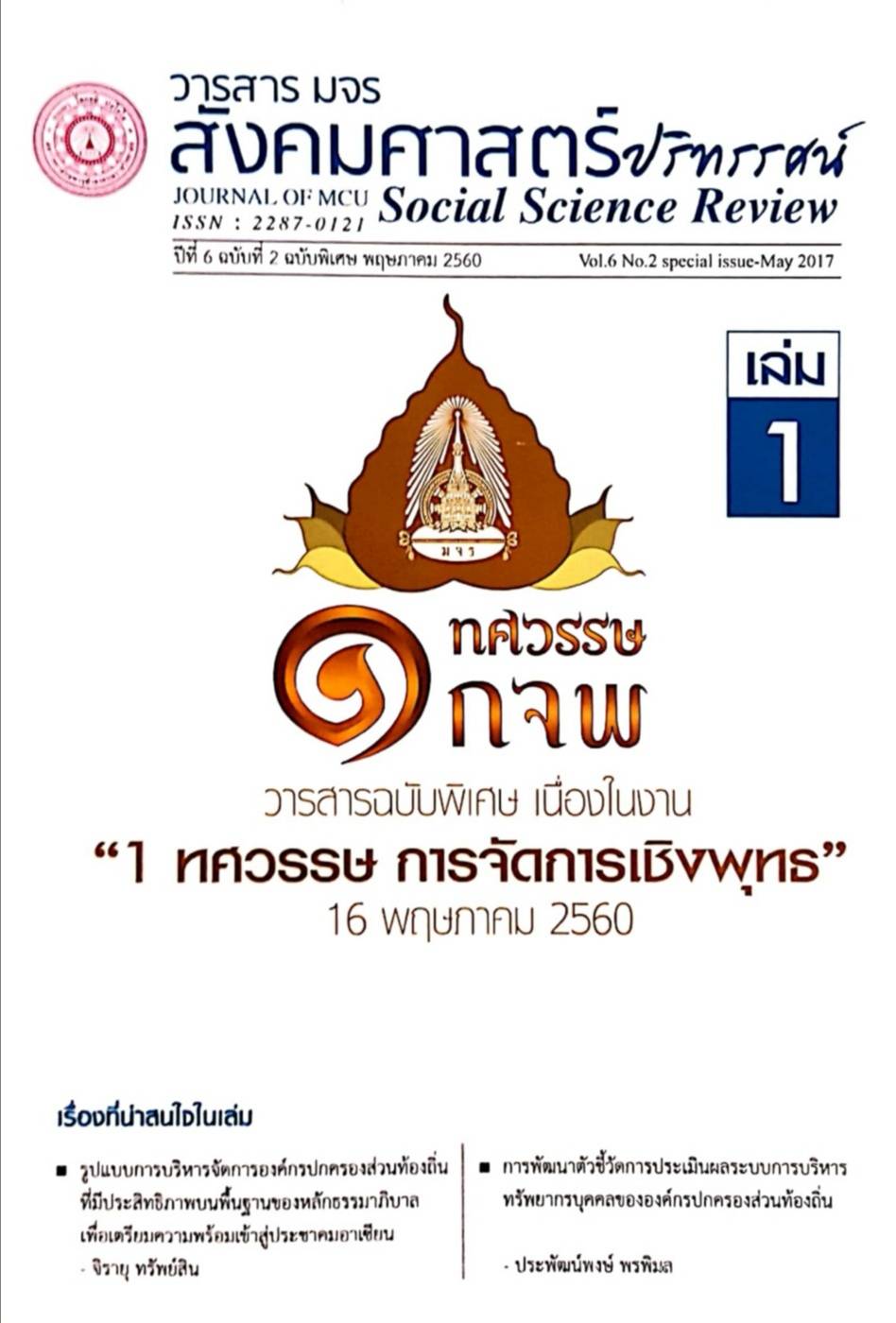ความคุ้มค่าในการลงทุนพลังงานทดแทนในประเทศไทย
คำสำคัญ:
ความคุ้มค่า, พลังงานทดแทนบทคัดย่อ
การวิจัยนี้มีวัตถุประสงค์เพื่อ 1) ศึกษาโครงสร้างต้นทุนพลังงานทดแทนในประเทศไทย 2) ศึกษาความคุ้มค่าในการลงทุนพลังงานทดแทนประเทศไทย และ 3) ศึกษาปัจจัยที่มีผลต่อความ
คุ้มค่าในการลงทุนพลังงานทดแทนในประเทศไทย การวิจัยนี้เป็นแบบผสานวิธีทั้งเชิงคุณภาพและ เชิงปริมาณ การวิจัยเชิงคุณภาพใช้ผู้ให้ข้อมูลสาคัญ (Key Informants) จานวน 20 ราย จาก
ผู้ประกอบการอุตสาหกรรมพลังงานทดแทนและนักวิชาการด้านพลังงานทดแทน โดยเลือกแบบ เจาะจง เครื่องมือเก็บรวบรวมข้อมูล คือ การสัมภาษณ์เชิงลึกและวิเคราะห์ข้อมูลโดยการอุปมาน
วิเคราะห์และการตีความ สาหรับการวิจัยเชิงปริมาณ ประชากร ได้แก่ บุคลากรที่ทางานในโรงงานที่ เข้าโครงการส่งเสริมก๊าซชีวภาพ 4 กลุ่ม จานวน 1,320 ราย โดยได้กลุ่มตัวอย่างจานวน 298ราย
ด้วยวิธีการเปิดตารางเคร็จซีและมอร์แกน๑ ใช้วิธีการสุ่มตัวอย่างแบบชั้นภูมิและการสุ่มตัวอย่าง แบบง่าย เครื่องมือเก็บรวบรวมข้อมูล คือแบบสอบถามแบบมาตรประมาณค่า 5 ระดับ สถิติที่ใช้
วิเคราะห์ข้อมูล ได้แก่ ค่าเฉลี่ย ค่าร้อยละ ค่าส่วนเบี่ยงเบนมาตรฐาน และการวิเคราะห์ถดถอยพหุ (Multiple regression)
ผลการวิจัยพบว่า
1) โครงสร้างต้นทุนพลังงานทดแทนในประเทศไทยทุกประเภทไม่แตกต่างกัน แต่เมื่อ พิจารณาในมิติผลตอบแทน พลังงานทดแทนประเภทก๊าซชีวภาพให้ผลตอบแทนคุ้มค่ากว่า โดยวัดได้
จากระยะเวลาในการคืนทุนประมาณ 3-4 ปี 2) ความคุ้มค่าในการลงทุนพลังงานทดแทนประเทศไทยนอกจากจะพิจารณาถึงการ ลงทุนในโครงสร้างด้านต้นทุนน้อยและได้กาไรมากแล้ว ยังต้องพิจารณาถึงความคุ้มค่าทางด้าน
เศรษฐกิจภาพรวม ด้านสังคมและชุมชน และด้านสิ่งแวดล้อม 3) ปัจจัยด้านต้นทุนโดยรวมส่งผลต่อส่งผลต่อความคุ้มค่าในการลงทุนพลังงานทดแทนใน
ประเทศไทยอย่างมีนัยสาคัญทางสถิติระดับ 0.05 อันได้แก่ ปัจจัยค่าที่ดิน ปัจจัยสิ่งปลูกสร้าง ปัจจัยเทคโนโลยีและที่ปรึกษา ปัจจัยค่าวัตถุดิบ และปัจจัยค่าไฟฟ้า
เอกสารอ้างอิง
ทดแทน. กรุงเทพฯ : เอเบิ้ล คอนซอลแตนส์ จากัด.
กระทรวงพลังงาน. (2557). การบริหารระบบจัดการพลังงาน. กรุงเทพฯ : กระทรวงพลังงาน.
กิตติยา กฤติยรังสี. (2554). “การวิเคราะห์ต้นทุนและผลตอบแทนของโรงไฟฟ้าก๊าซชีวภาพ”.
วิทยานิพนธ์วิศวกรรมศาสตรมหาบัณฑิต สาขาวิชาวิศวกรรมศาสตรสิ่งแวดล้อม :
มหาวิทยาลัยเทคโนโลยีสุรนารี.
ณิชยารัตน์ พาณิชย์. (2556). “แนวทางการบริหารจัดการพลังงานหมุนเวียนในระดับชุมชนของ
ประเทศไทย”. วิทยานิพนธ์วิทยาศาสตร์มหาบัณฑิต. คณะพัฒนาสังคมและสิ่งแวดล้อม
: สถาบันบัณฑิตพัฒนบริหารศาสตร์.
พระชาตรี อุปสโม (สุขสบาย). (2557). “กระบวนการเสริมสร้างความรับผิดชอบต่อสังคมของ
องค์กรธุรกิจ : กรณีศึกษาวัดอโศการาม อาเภอเมือง จังหวัดสมุทรปราการ”.
วิทยานิพนธ์พุทธศาสตรมหาบัณฑิต. บัณฑิตศึกษา: มหาวิทยาลัยมหาจุฬาลงกรณราช
วิทยาลัย.
เพชรวดี กาญจนวิโรจน์. (2553). การสร้างกลยุทธ์ด้านความรับผิดชอบต่อสังคมเพื่อสร้าง
ภาพลักษณ์ที่ดีของบริษัท : กรณีศึกษาบริษัท ไทยออยล์ จากัด (มหาชน). สาระนิพนธ์
บริหารธุรกิจมหาบัณฑิต. มหาวิทยาลัยหอการค้าไทย.
บนนรา ชวนอาจ. (2553). “ปัจจัยที่มีผลต่อการตัดสินใจเข้าร่วมโครงการส่งเสริมการแสดงความ
รับผิดชอบของผู้ประกอบการอุตสาหกรรมต่อสังคม”. วิทยานิพนธ์วิทยาศาสตร์
มหาบัณฑิต.คณะพัฒนาสังคมและสิ่งแวดล้อม สถาบันบัณฑิตพัฒนบริหารศาสตร์.
อรทัย วรรคาวิสันต์. (2553). การวิเคราะห์ความเป็นไปได้โครงการลงทุนผลิตก๊าซชีวภาพจากมูล
สัตว์ วิทยานิพนธ์บริหารธุรกิจมหาบัณฑิต สาขาบริหารธุรกิจ. มหาวิทยาลัยกรุงเทพ.
ดาวน์โหลด
เผยแพร่แล้ว
รูปแบบการอ้างอิง
ฉบับ
ประเภทบทความ
สัญญาอนุญาต
ลิขสิทธิ์ (c) 2020 วารสาร มจร สังคมศาสตร์ปริทรรศน์

อนุญาตภายใต้เงื่อนไข Creative Commons Attribution-NonCommercial-NoDerivatives 4.0 International License.
เพื่อให้เป็นไปตามกฎหมายลิขสิทธิ์ ผู้นิพนธ์ทุกท่านต้องลงลายมือชื่อในแบบฟอร์มใบมอบลิขสิทธิ์บทความให้แก่วารสารฯ พร้อมกับบทความต้นฉบับที่ได้แก้ไขครั้งสุดท้าย นอกจากนี้ ผู้นิพนธ์ทุกท่านต้องยืนยันว่าบทความต้นฉบับที่ส่งมาตีพิมพ์นั้น ได้ส่งมาตีพิมพ์เฉพาะในวารสาร มจร สังคมศาสตร์ปริทรรศน์ เพียงแห่งเดียวเท่านั้น หากมีการใช้ภาพหรือตารางหรือเนื้อหาอื่นๆ ของผู้นิพนธ์อื่นที่ปรากฏในสิ่งตีพิมพ์อื่นมาแล้ว ผู้นิพนธ์ต้องขออนุญาตเจ้าของลิขสิทธิ์ก่อน พร้อมทั้งแสดงหนังสือที่ได้รับการยินยอมต่อบรรณาธิการ ก่อนที่บทความจะได้รับการตีพิมพ์ หากไม่เป็นไปตามข้อกำหนดเบื้องต้น ทางวารสารจะถอดบทความของท่านออกโดยไม่มีข้อยกเว้นใดๆ ทั้งสิ้น





